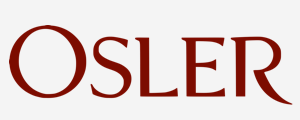About Osler

6 Offices 400 Attorneys
Osler Hoskin and Harcourt LLP is a leading Canadian law firm with over 400 lawyers spread across six offices. Since 2016, Osler has been using Closing Folders to power closings in its legal transaction support center, “Osler Works – Transactional”.
Natalie Munroe has devoted much of her professional career to closing complex, multijurisdictional transactions. She was a lawyer at elite law firms in New York and Toronto and had worked on several transactions as external counsel. However, it wasn’t until Natalie’s role as internal legal counsel at a major bank – that she started to question the way in which a typical transaction closing is conducted.
The Genesis of Osler’s Transactional Services Support Center
As a buyer of legal services, Natalie knew that she would receive the best service – in terms of quality and value – if the external law firms she retained could automate the standardized parts of a transaction and provide high-quality, tailored advice on the substantive parts. “Over the course of my career, I’ve participated in countless transactions” says Munroe. “Because of that, I began to see how if you leveraged technology and created a more efficient process, the entire closing experience could be far more effective.”
Armed with this insight, Natalie sought out an opportunity to combine her transactional skills and experience as a client to improve the way in which transactions are conducted. She found an ideal partner in Osler, Hoskin & Harcourt LLP, a top Canadian law firm. “Osler has a history of being a leading transactional firm. Instead of waiting for clients to request or mandate that we use new technology tools, we want to be among the first in the market leveraging emerging legal technology like Closing Folders to enhance the services we provide our clients.”
For its part, Osler was looking to emulate its highly successful e-discovery services with an equally market driven array of transactional services. With Natalie at the helm, Osler Works – Transactional, a team of 13 transactional lawyers and other professionals in Ottawa, Canada, was launched in the fall of 2016. “It was recognized by the firm that technology could be used to make the process and execution of a closing more efficient and effective. “
Technology’s Role in Osler Works – Transactional
After a comprehensive review of the market, Osler found and adopted some of the best technologies to support its corporate and commercial transactions, including a document generation tool, a machine-learning tool (for legal due diligence review), and an electronic signatures tool. And, of course, Closing Folders. “Closing Folders allows our lawyers to move away from the more cumbersome process of using paper or PDFs to electronically organize and manage a closing. The process is clean and simple.”
From Zero to 15,000 in 365 Days
One year after the official launch of Osler Works – Transactional, the team had already used Closing Folders to run over 300 legal transactions, generating over 3,000 signing packages and tracking over 15,000 document versions. “As a team, we use Closing Folders on a daily basis. We don’t do traditional paper closings. We don’t do closings that involve numerous emails and the creation of signature pages by PDF. We only use Closing Folders.”
Collaboration is Key to Osler Works – Transactional’s Success
Closing Folders’ greatest strength hasn’t been the automation. Rather, the tool has been invaluable in enabling teams across multiple offices to collaborate effectively on complex legal transactions. “Prior to Closing Folders, depending on email for collaboration meant that everything was disjointed and the process was cumbersome. With Closing Folders, you have a real-time picture of your closing and it’s easy to identify the status of each document and which signatures are missing.” states Munroe.
Table of contents
